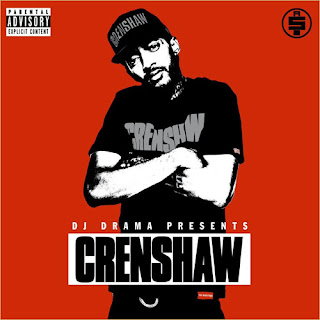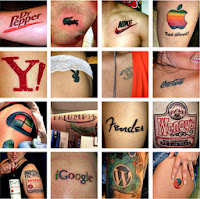#NewRules
Jay
Z wasn't lying when he proclaimed 'new rules' after dropping his
twelfth studio album, Magna
Carta Holy Grail. His latest offering was rolled out first through an app available exclusively to 1 million lucky
Samsung Galaxy owners via a partnership with the brand. The innovative digital
release subsequently led to the Recording Industry Association of America
(RIAA) changing their rules regarding gold and platinum
certification, with the album instantaneously reaching such status via the 1M Samsung winners .
 Other
artists have respectively extended the same creativity they display
in their music to their marketing campaigns. Take Kanye West for
example who for his Yeezus album not only defied codes
and convention by choosing not to contain any artwork in
a minimalist effort.
Other
artists have respectively extended the same creativity they display
in their music to their marketing campaigns. Take Kanye West for
example who for his Yeezus album not only defied codes
and convention by choosing not to contain any artwork in
a minimalist effort.
'Ye
also used a guerilla marketing campaign to promote his album, with
visuals of Mr West's head projected on various buildings (from
museums, universities, abandoned properties and high fashion stores)
as he rapped new single New
Slaves. The
scene was executed simultaneously across cities across the globe with
the coordinates to locations blogged only hours in advance. Though,
no stranger to controversy without unauthorised permission many of
the projections which garnered large crowds were shut down.
Nevertheless, the campaign helped to created an edgy social experiment
for his fans, reflective of the album tones. And my personal
favourite album of 2013.
 West
Coast rapper Nipsey Hussle (- who I admittedly was unfamiliar with
prior to his Crenshaw tape), now deservedly sits in
heavy rotation - thanks to the sheer marketing genius of his
$100 mixtape. Inspired by marketing professor Jonah
Berger's book, Contagious: Why things catch on, Nipsey made
history. The #NewRules Nipsey Hussle helped to create was even
saluted by the GOAT himself, when Jigga purchased 100
copies in respect of the movement. The brilliance came from the
fact that Nip did not hold his fans to ransom, demanding they pay
the staggering $100 fee. But alternatively also sold the
mixtape at a standard commercial price on iTunes and FREE to
download on online mixtape distribution platform Datpiff. The campaign was initially met by critics and naysayers who were quickly silenced
when Nipsey sold all 1,000 of the limited physical copies at $100 each in 24hours.
The independent star in one day recouping $100,000 in profit on a
promotional release which is typically free. He explained
his entrepreneurial decision in interview stating,
West
Coast rapper Nipsey Hussle (- who I admittedly was unfamiliar with
prior to his Crenshaw tape), now deservedly sits in
heavy rotation - thanks to the sheer marketing genius of his
$100 mixtape. Inspired by marketing professor Jonah
Berger's book, Contagious: Why things catch on, Nipsey made
history. The #NewRules Nipsey Hussle helped to create was even
saluted by the GOAT himself, when Jigga purchased 100
copies in respect of the movement. The brilliance came from the
fact that Nip did not hold his fans to ransom, demanding they pay
the staggering $100 fee. But alternatively also sold the
mixtape at a standard commercial price on iTunes and FREE to
download on online mixtape distribution platform Datpiff. The campaign was initially met by critics and naysayers who were quickly silenced
when Nipsey sold all 1,000 of the limited physical copies at $100 each in 24hours.
The independent star in one day recouping $100,000 in profit on a
promotional release which is typically free. He explained
his entrepreneurial decision in interview stating,
"It’s
2013. Whether we accept it or not, buying music is a choice, not a
requisite. When I think of the psychology behind what makes me
purchase an artists album, it’s always a form of reciprocation.
Almost like a token of appreciation after I experience the product.
The reason I chose to charge $100 dollars each copy and only start
with 1000 units is because I tailor making my music for those who are
listening. it's not about stepping outside of what I’m known for in
hopes of new discovery. What that means less is fans that are better
served. I'm more or less focused on fully serving the ones that have
connected all ready. That being said its a value over volume thing.
If I'm goin to offer a product made with no compromise or concession
to the platforms (radio, A&R opinion, label
bias) ect...ect..then the way we sale it has to change." -
Nipsey Hussle, Rap Radar
The campaign
was fittingly titled Proud2Pay because
effectively thats what his fans were, proud to pay! It was a choice, being offered not one, or two but THREE different purchase options. The strategic move also created a huge amount of publicity and buzz which
many myself included caught on to. As even if you were not willing
or could simply not afford to pay the $100 amount, I'm pretty
sure after hearing the story you at least downloaded the free copy
and thus helped to build Nipsey's fan base. Nipsey's genius
didn't stop there, as he went on to capitalise on the
exclusivity aspects of the physical purchase. Not only did loyal fans
who copped the physical $100 release receive their copy signed
by the man himself and appropriately numbered (in the
range of buyers). But were also treated to a free concert,
exclusive to the Proud2Pay buyers, creating a live
experience for his core trustee base and giving his fans their
moneys worth.
Jay
Z, Kanye and Nipsey have all done incredible things this year in
terms of revolutionising music marketing. But none come close to
the woman who inspired this post and the amazing
accomplishments she received with her self-titled fifth
album Beyoncé. The Queen Bey herself proved exactly why she
was worthy of such a title when she surprised fans and her own
label executive alike, in dropping a surprise album
at midnight on the 13th December. Social media revelled
in the news as it spread like wildfire. So much so that 80,000 copies
were sold on word of mouth alone in the first three hours before
going on to become number one in 100 countries by the weekend. The
album was described as visual art, with a music video to
accompany each track, the album was also exclusive
to iTunes for a week and only available to purchase as a whole
without the option to select singles. Beyoncé opted out of the
traditional three month press and promotional tour by releasing
her album without any lead singles or marketing. Recognising her
iconic status Beyoncé let her fans (much like Nipsey)
prove their loyalty to her brand. As they trusted in her,
to blindly buy a full album without a hint of any content, direction or tone of the project. Simply because they adore her,
high up on her pedestal where she rightfully belongs.
 Nipsey
Hussle was not only able to sell all one thousand copies of his
limited $100 tape. But also through fandom created a demand that
he's still selling them now, months on without having ever released
an album! Beyoncé was also able without marketing or promotional tools to break her own album selling record for the very same reason. Their
fans didn't just buy the music, they brought into the
artist and subsequently the dream they sold. So despite a project
being ten times above its usual retail value or a
complete blind-side, their core consumer base placed value
on the albums through invested value in the artist.
Nipsey
Hussle was not only able to sell all one thousand copies of his
limited $100 tape. But also through fandom created a demand that
he's still selling them now, months on without having ever released
an album! Beyoncé was also able without marketing or promotional tools to break her own album selling record for the very same reason. Their
fans didn't just buy the music, they brought into the
artist and subsequently the dream they sold. So despite a project
being ten times above its usual retail value or a
complete blind-side, their core consumer base placed value
on the albums through invested value in the artist.
Brand
loyalty isn't a term that can be monopolised for consumer goods, but
also an appropriate description of your favourite singer/rapper as
highlighted here; and raises further question for the future of
marketing and promotions in the music industry going into 2014. The
one thing that is certain is artist control. Nipsey's mantra is 'F
the middle man' (record labels) as an independent artist and
Beyoncé reportedly went against the advice of management or simply
kept them in the dark. I question if these are New rules or
simply highlight that there are now, no rules? If there are artists, there
are fans. Everything else seems debatable...



Comments
Post a Comment